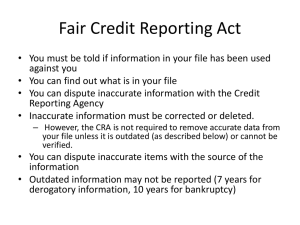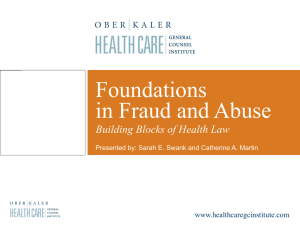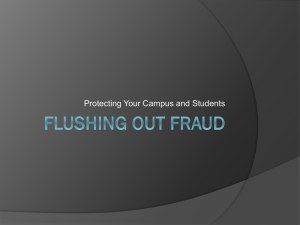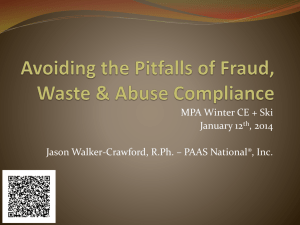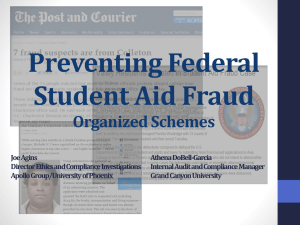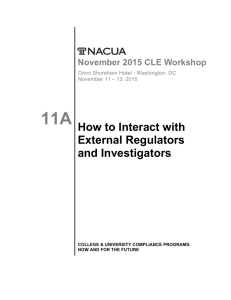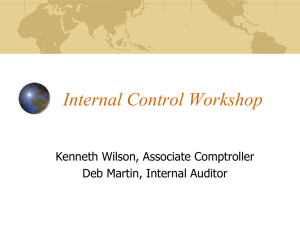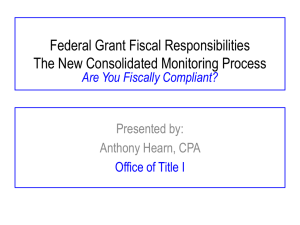US Department of Education Office of Inspector General
advertisement
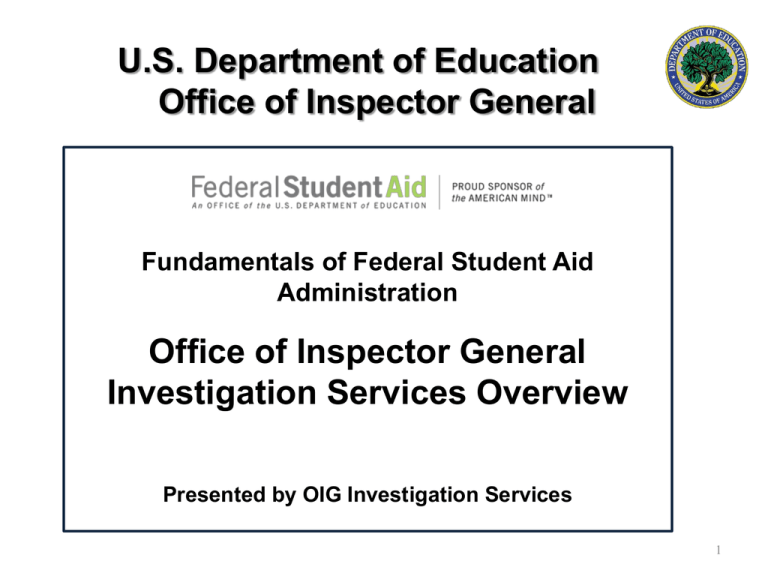
U.S. Department of Education Office of Inspector General Fundamentals of Federal Student Aid Administration Office of Inspector General Investigation Services Overview Presented by OIG Investigation Services 1 AGENDA • • • • • • • • • • • OIG Organization and Mission FSA and OIG Coordination Sources of Allegations Fraud Indicators Examples of Title IV Fraud Schemes Detecting and Preventing Distance Education Fraud Standards of Administrative Capability Criminal Liability Civil Liability Contact Information Question and Answer 2 ORGANIZATIONAL CHART Part of the Department BUT… Independent 3 Inspector General Act of 1978 …to prevent and detect fraud, waste and abuse and improve the economy, efficiency and effectiveness of Education Department programs and operations. 4 OIG Mission Statement To promote the efficiency, effectiveness, and integrity of the Department's programs and operations, we conduct independent and objective audits, investigations, inspections, and other activities. 5 OIG Components • Audit Services • Investigation Services • Evaluation, Inspection and Management Services • Information Technology Audits and Computer Crime Investigations • Immediate Office/Counsel/Public Affairs 6 Investigation Services Regional Map NORTH CENTRAL REGION Chicago, IL Ann Arbor, MI & Nashville, TN NORTHEASTERN REGION New York, NY & Boston, MA WESTERN REGION Sacramento, CA Long Beach, CA Phoenix, AZ & Denver, CO MID-ATLANTIC REGION Washington, DC Philadelphia, PA & Pittsburg, PA SOUTH CENTRAL REGION Dallas, TX Kansas City, MO SOUTHEASTERN REGION Atlanta, GA; Pembroke Pines, FL & San Juan, PR 7 FSA and OIG Coordination The Office of Inspector General assists the Department in promoting the integrity of the Title IV programs. • Review and comment on all regulations to suggest areas for improvement • Regularly exchange information with FSA to identify current issues in compliance and abuse and coordinate oversight and investigatory activities when appropriate • Issue Management Information Reports to alert the Department about serious fraud and corruption trends 8 FSA and OIG Coordination • Link to OIG’s Distance Education Fraud Ring Investigative Program Advisory Report (IPAR) http://www2.ed.gov/about/offices/list/oig/invtreports/l42l0001.pdf • Information for Financial Aid Professionals (IFAP) http://www.ifap.ed.gov/ifap/ • Dear Colleague Letter GEN-11-17 http://www.ifap.ed.gov/dpcletters/GEN1117.html • Final Management Information Report PIN Security Vulnerabilities http://www2.ed.gov/about/offices/list/oig/auditreports/fy2013/x21l0002.pdf 9 ED/OIG Special Agents are Federal Law Enforcement Officers Special Agents receive training in: • Interviewing/Interrogation • Criminal Law • Civil Law • Program and Contract Fraud • Firearms/Defensive Tactics • Search and Arrest Warrants Fraud A deliberate distortion of the truth in an attempt to obtain something of value. or Lying and cheating. 11 Sources of Allegations • • • • • • • • • • • • • OIG Hotline OIG Audits and Inspections Department Program Offices School Employees and Officials Guarantee Agencies Contractors and Sub-contractors Grantees and Sub-grantees Citizens and Students Competing Vendors/Schools Other Federal Agencies U.S. Attorney’s Offices Other OIG Investigations State and Local Law Enforcement Agencies • Federal Bureau of Investigation • Qui Tam Actions 12 Evidence Gathering • • • • • Statutory and Regulatory Access to Records Consensual Search/Access Search Warrant Court Order Subpoenas o Grand Jury o Administrative • Interviews 13 Statutory and Regulatory Access to Records • Under the Inspector General Act of 1978, as amended, OIG can access any records available to the Department of Education in order to perform audits, investigations and inspections of Department programs and operations. • The Family Educational Rights and Privacy Act (FERPA) requires schools receiving funding from the Department of Education to protect the privacy of student education records. In many cases consent must be received from a parent or student before records can be disclosed. • FERPA provides that consent is not required in order to disclose student records to the Office of Inspector General. The regulations provide that representatives of the Secretary, which include OIG, may have access without prior consent in connection with an audit, evaluation, or enforcement of legal requirements related to the Department’s programs. FERPA regulations can be found at 34 CFR Part 99 http://www2.ed.gov/policy/gen/guid/fpco/index.html 14 • Weak controls • Little or no oversight • Lax rules • Debt • Addictions Fraud Triangle • Everyone does it. • I was only borrowing the money. • I was underpaid and deserve it. • Status • Greed Fraud Indicators One person in control No separation of duties Lack of internal controls/ignoring controls No prior audits High turnover of personnel Unexplained entries in records Unusually large amounts of payments for cash Inadequate or missing documentation Altered records Non-serial number transactions Inventories and financial records not reconciled Unauthorized transactions Related Party Transaction Repeat audit findings How You Can Help • • • • Ensure that staff receive necessary Title IV training Review documents thoroughly Question documents/Verify authenticity Request additional information from the students or parents • Compare information on different documents • Contact the OIG if you suspect fraud • Cooperate with the OIG in connection with an audit or investigation 17 Examples of Title IV Fraud Schemes Related to Students • FAFSA Fraud • • • • • • • • Social Security Number Alien Registration Status Dependency Status Income and Assets Number of Family Members in College Falsification of GEDs/HS Diplomas Identity Theft Distance Fraud Schemes 18 Examples of Title IV Fraud Schemes Related to Schools Ghost students Leasing of eligibility Default rate fraud 90/10 Rule manipulation scheme Financial statement falsification Falsified last date of attendance Obstruction of a federal audit or program review Fraud/theft by school employee FAFSA fraud - enrollment Falsification of GEDs/HS diplomas Falsification of attendance and Satisfactory Academic Progress Falsification of grades Failure to make refunds Loan theft/ forgeries 19 Example of Criminal Investigation Click on Photo for Video 20 Example of Criminal Investigation • President of Galiano Career Academy, Michael Gagliano used a "diploma mill" owned by his wife, to make students eligible for student assistance programs. • The Department of Education conducted a program review at Galiano Career Academy in 2009, and when reviewers saw suspicious activity, a criminal investigation was launched. OIG Special Agents later learned Michael Gagliano installed cameras and microphones prior to the Department of Education's visit so he could hear their conversations. 21 Example of Criminal Investigation Former President of Galiano Career Academy Sentenced for Theft of Federal Funds, Obstruction of a Federal Audit, and Aggravated Identity Theft On February 25, 2014, in Orlando, FL, U.S. District Judge Roy B. Dalton sentenced Michael Gagliano (50, Sanford) to four years in federal prison for theft of government property, obstruction of a federal audit, and aggravated identity theft. As part of his sentence, the court also ordered restitution and entered a money judgment in the amount of $2,105,761.00, the proceeds of the charged criminal conduct. Gagliano pleaded guilty on August 16, 2013. 22 Examples of Criminal Investigations in the Region 23 Example of Criminal Investigation • • • • Jaime Torres a/k/a Ivan Orta Cuprill Loss: $10,000 ID Theft investigation uncovered an escaped murderer who used false identity to avoid apprehension and obtain federal student aid 24 Other Criminal Statutes Used in Connection with OIG cases: • 18 USC § 371 CONSPIRACY • 18 USC § 1001 FALSE STATEMENTS • 18 USC § 1341 MAIL FRAUD • 18 USC § 1343 WIRE FRAUD • 18 USC § 1014 BANK FRAUD • 18 USC § 641 THEFT OF GOVERNMENT FUNDS • 18 USC § 666 THEFT CONCERNING FEDERAL PROGRAMS • 18 USC § 1030 COMPUTER FRAUD/EXCEEDING ACCESS Civil False Claims Act 31 U.S.C. § 3729 • • • • • Knowingly presents, or causes to be presented, to the United States Government a false or fraudulent claim for payment or approval (no proof of specific intent to defraud is required.) …or makes, uses, or causes to be made or used, a false record or statement to get a false or fraudulent claim paid or to conceal, avoid, or decrease an obligation to the Government. Burden of Proof – “Preponderance of the Evidence” (More likely than not). Specific Intent to Defraud the Government not an Element. Liable for Civil Penalties of between $5.5K and $11K per count plus 3 times the amount of actual damages. 26 Why Report Fraud To the OIG? • • • • • • • • • Statutory and regulatory requirements Ethical responsibility To deter others from committing fraud and abuse To protect the integrity of the Title IV Programs To avoid being part of a fraud scheme To avoid administrative action To avoid civil penalties To avoid criminal prosecution To avoid incarceration 27 34 CFR § 668.16 Standards of Administrative Capability The Secretary considers an institution to have administrative capability if the institution: (f) Develops and applies an adequate system to identify and resolve discrepancies in the information that the institution receives from different sources with respect to a student’s application for financial aid under Title IV. (g) Refers to the Office of Inspector General…any credible information indicating that an applicant for Title IV, HEA program assistance may have engaged in fraud or other criminal misconduct in connection with his or her application. Schools must also refer to the OIG any third-party servicer who may have engaged in fraud, breach of fiduciary responsibility, or other illegal conduct involving the FSA Programs. 28 Criminal Liability • 18 U.S.C. § 2, Aiding and Abetting Whoever commits an offense against the United States or aids, abets, counsels, commands, induces or procures its commission, is punishable as a principal. • 18 U.S.C. § 4, Misprision of a Felony Whoever, having knowledge of the actual commission of a felony cognizable by a court of the United States, conceals and does not as soon as possible make known the same to some judge or other person in civil or military authority under the United States, shall be fined under this title or imprisoned not more than three years, or both. 29 Inspector General’s Hotline 1-800-MIS-USED http://www2.ed.gov/about/offices/list/oig/hotline.html OIG Investigation Services Contacts City/State Ann Arbor, MI Atlanta, GA Boston, MA Chicago, IL Dallas, TX Denver, CO Kansas City, MO Long Beach, CA Telephone No. (312) 730-1630 (404) 974-9430 (617) 289-0174 (312) 730-1630 (214) 661-9530 (303) 844-0058 (816) 268-0530 (562) 980-4141 31 OIG Investigation Services Contacts (continued) City/State Nashville, TN New York, NY Pembroke Pines, FL Philadelphia, PA Phoenix, AZ Pittsburgh, PA San Juan, PR Washington, DC Telephone No. (615) 902-7327 (646) 428-3861 (404) 974-9430 (215) 656-6900 (562) 980-4141 (215) 656-6900 (787) 766-6278 (202) 245-6918 32 QUESTIONS?


